- Home
- Chris Wraight
Master of Dragons Page 2
Master of Dragons Read online
Page 2
Caradryel dragged himself upright, heart beating hard. As he did so the dragon came around for another pass. Flames thundered from its gaping jaws and hit the centre of the druchii vessel, punching clear through, shattering and carving, before exploding in a ball of steam as seawater gushed through the breach. The dragon swooped past and its tail lashed out, striking the reeling corsair amidships and breaking its spine. The warship wallowed in a flaming whirlpool for a moment before sinking fast, pulled down below as if grasped by greedy hands.
The dragon surged away after the remaining two ships. They had both turned hard into the wind and were beating a furious retreat, but it was hopeless. Caradryel steadied himself against the Ithaniel’s railing. The dragon reached the first corsair with a single wing-thrust, shooting across the water faster than a thrown spear. It vomited another burst of flame then pounced on the remains, seizing a mast-top in its maw and savaging it. The ship broke apart in a flaming tumble of splinters and shards.
Then the second. A score of heavy wing beats, a diving attack, a lash of the long sinuous tail, and it was over. All that remained of the corsair squadron was a miserable collection of bobbing flotsam. Those druchii not killed by the flames went under quickly, dragged down by their armour. A few deck-slaves clung to the wreckage, shivering from the shock, the cold, the awe.
Caradryel was unable to do much more than observe. The sight both scared and thrilled him – the exhibition of such power went far beyond anything he had seen before. The dragon’s movements were almost lazy in their effectiveness, as if the creature were barely summoning up more than a token effort. As he gazed up at the wheeling wingtips Caradryel found himself lost in the arrogance of it. It was primordial. It was astonishing.
He knew then why it made him afraid: he couldn’t control it, couldn’t hope to control it. It was as pure and mindless as the storms that raced down from the Annulii. Caradryel had never encountered anything that he truly believed he couldn’t control, whether through manipulation or flattery or the careful use of well-placed bribes. A dragon, though… Only a fool or a demigod would try to master that.
The creature came to a halt before the Ithaniel’s prow, maintaining its position in mid-air with a heavy sequence of downbeats. Its long, lean head rose high above the mast-top and its tail slashed through the waves below. Hot, metallic air washed across the decks, making the sails fill and flap.
Arian was the first to recover. He stood up in the prow, looking tiny under the shadow of the beast.
‘My lord!’ he cried, saluting. ‘Our thanks!’
It was then that Caradryel saw the figure mounted on the dragon’s shoulders. He wore silver armour chased with black runes and a tall helm crested with drake-wings. A heavy crimson cloak hung around him, pooling in the muscle-hollows of the dragon’s hide. One silver gauntlet rested on the dragon’s neck, the other held a naked blade.
He looked like a figure out of ancient legend – an avatar of Aenarion brought back to life.
‘Where are you headed?’ the dragon rider called. His voice rang clearly across the waves – a calm, authoritative voice, coloured with the aristocratic accent of Caledor.
‘Lothern, lord, on business for the Lord Riannon.’
‘Then make your way. More druchii will taint these waters before the sun sinks and I do not have the leisure to slay them all.’
Arian bowed. ‘We had not been warned of corsairs, nor did I dream to see a dragon rider aloft. Is something amiss?’
The dragon rider laughed wryly. ‘Amiss? That depends on your point of view. The Phoenix King returns to his throne, hence the seas are alive with intrigue and dragons are on the wing. Our meeting here was by chance – on another day you would have been alone with your assassins.’
‘Caledor returns!’ cried Arian. ‘You bring great tidings, lord.’
The dragon rider didn’t reply. His steed beat its wings fiercely, bearing them both higher and away from the ship. Caradryel found himself wishing they would linger. The spectacle of it all – the dazzling, bejewelled creature of the high airs, the aura of raw magic bleeding from its armoured flanks – it was a heady, intoxicating presence.
A few powerful downbeats, though, and the dragon was spiralling away from them. Mere moments later it was little more than a speck of glittering blue against an empty sky.
The Ithaniel drifted on the open sea, alone again, surrounded by the blackened evidence of the dragon’s power.
Arian stirred himself. ‘Lower the boats,’ he ordered, moving down from the quarterdeck. ‘Take aboard survivors. Slaves will be freed; druchii taken to Lothern. With haste! We must be under sail again soon.’
Spearmen and deck-hands shook themselves and stumbled back to work. The ship was quickly thick with activity as repairs were made and wounds bound up. Tales of the dragon could wait until they were safely in port.
Amid it all, Caradryel remained motionless, staring up at the heavens, his hands still clutching the rails.
That is true power, he thought. That is greatness. The one who controls such power controls the world.
He didn’t notice Arian coming up to him, a wide grin on his face. The captain stooped to pick up Caradryel’s discarded sword and handed it to him, blade-first.
‘Dreaming?’ he asked. Many lines of anxiety had fallen away from his face.
Caradryel took the sword and sheathed it self-consciously. ‘A dragon rider,’ he said, trying to affect disinterest. ‘How unexpected.’
Arian laughed. ‘We were honoured. Did you not see the livery? You were in the presence of the king’s brother.’
‘Imladrik?’
‘And you missed your chance for advancement.’
‘The Master of Dragons,’ Caradryel remarked. ‘What great fortune.’
Arian turned away, a smile playing on his lips. ‘I thought you didn’t believe in fortune,’ he said, heading back up to the prow to oversee the retrieval of the boats.
‘I don’t,’ murmured Caradryel, too soft for hearing, his mind working hard.
Chapter Two
Imladrik sat loosely in the saddle, no longer giving directions to his mount but letting him find his way amid the paths of the skies. Draukhain headed south-west, gliding languidly. The destruction of the druchii squadron had been a trivial task for one of his breeding and his enormous lungs worked as rhythmically as ever, untroubled by the diversion, drawing in the chill wind and transmuting it into fiery exhalations.
The work may have been easy but the orders had been an insult. Dragons were rare and perilous creatures; to turn them into celebratory attendants of Caledor’s homecoming was an ignorant misuse of power.
You are angry.
Draukhain’s mind-song echoed in Imladrik’s head like one of his own thoughts.
Not angry, Imladrik returned. Weary.
Weary? I have borne you aloft a hundred leagues. Draukhain snorted, sending flecks of smouldering ash cascading over his immense shoulders. I am weary; you are angry. You rage against your brother who commands you.
Ah. You read my thoughts now.
I do not need to. This anger is a waste – it serves no purpose.
Imladrik shifted in the saddle. After hours of flight his limbs were tight and his muscles raw. The ocean glittered below him, a shallow curve extending in all directions, glossy with reflected sunlight. Soon the sun would begin to dip, descending in golds and reds towards the western horizon, but for the moment the world looked pristine, awash with light, just as it must have done in the dawn following creation.
My brother shows disrespect, mind-sang Imladrik. To you, great one. He does not understand you.
How many are left who truly understand, kalamn-talaen? Do not judge him for that.
Kalamn-talaen: the little lord. A whimsical title, one the dragons used to distinguish between Imladrik and the great-grandsire of his bloodline, Cal
edor Dragontamer, whom they called kalamn-kavannaen, the great lord. Imladrik had heard their minds burst into joyous celebration at the very mention of the Dragontamer – perhaps he had been the only mortal other than Aenarion to command their total respect. The rest of the asur, Imladrik included, were merely indulged, as if in homage to that one undying example of greatness.
It is not like you, Imladrik returned, to be so magnanimous.
No, it is not. Draukhain snorted again, producing a gout of glutinous smoke that rolled across his sapphire-scaled skin. But I am in a good temper this night.
For the ending of so many druchii?
Maybe so. Or maybe the golden sun on the sea, or maybe your company. Who can tell?
That brought a smile to Imladrik’s stern face. I am glad one of us is, whatever the cause.
They flew further west. The first cliffs of Ulthuan became visible as a blurred line of dark grey against the horizon. The rock-ramparts grew in size, steadily accumulating detail and definition. Soon the eastern curve of the Annulii could be made out, vast and gold-glittered and crowned with ice.
Where shall I bear you, then? sang Draukhain, dipping his head and sweeping closer towards the scudding wave-tops.
Do you have to ask? returned Imladrik. His mind-voice, unguarded for a moment, was a mix of yearning and resignation. He didn’t mind giving that away – Draukhain was hard to deceive, even for one with his command of dragonsong.
A deep, grinding sound rumbled up from Draukhain’s belly. Imladrik knew how to interpret the sound, for he understood the great dragon’s soul nearly as well Draukhain knew his own: the creature approved, was reassured, understood his reasons and wished him well for much earned repose and restoration. All these things could be divined from a single harmonic. Dragons were creatures of music and instinct, more eloquent in gestures than they were in words.
Draukhain banked over to the left, pulling fractionally to the south, aiming towards the high peaks, to the realm of Cothique.
We shall be there before the sun sets, sang Draukhain.
Do not hurry, returned Imladrik, watching the last of the light on the water as it flickered beneath him. Enjoy the remains of this day. You have earned it, even if none but I will ever know it.
She was not waiting for him. She never lingered on the balcony, staring up into the skies for his return, pining like a maiden for her lover in the poetic romances of Avelorn. Her work was too important, too all-consuming for that.
When he found her at last, after slipping through the gates of Tor Vael and up the echoing stairways, she was doing what she always did, so absorbed in it that the rest of the world might have been a fiction spun in the minds of others.
Imladrik paused at the entrance to her chamber. She was bathed in the light of dusk from the open window, framed against a darkening vista of high mountain-slopes. She was seated, her shoulders stooped over an angled caelwood writing table.
Imladrik leaned against the doorframe, his movements silent, his breath shallow. He watched her trace the shape of runes against parchment, working the quill deftly. He saw her grey eyes latched on to her work: twin vices of concentration. He saw her hands moving. He saw her slender frame crouching over the desk, and regretted the tight curve of her spine. He had warned her about it often, offering to have a new chair made, pleading with her not to work for so long without rest.
His lips twitched into a smile. She never listened. She had always been stubborn – not angry, never irritable or shrewish, just stubborn – like the hard, dark rock of his homeland.
‘My lady,’ he said softly.
Yethanial’s head jerked up. She glared at him, startled as if roused from a deep sleep.
Then she leapt up, her grey robe rustling around her. Her pale face brightened and the grip of exertion fell away from her features.
‘My lord!’ she cried, her voice ringing with joy.
Imladrik laughed, pushing himself away from the door to meet her. They embraced, clasping one another tight.
As he pressed against her, Imladrik drew in her familiar aromas of homecoming: coarse woollen fabric, inks that stained her fingers, crushed petals of the seaflower he had placed in her hair before he’d left. He guessed that he would smell of sweat, brine and dragon. Yethanial professed never to mind that; he doubted whether he believed her.
‘I was not expecting you,’ she said, nestling her face into his shoulder.
‘I told you I would return before nightfall.’
‘Then I did not listen.’
‘You never do.’
He pushed her away, holding her at arm’s length to get a better look at her.
He thought then, not for the first time, how different they were. Imladrik knew well enough how he looked: tall, broad-shouldered, his body tempered into hardness by the demands of riding the great drakes. He knew how severe his features were, hewn roughly, so he’d been told, like the white cliffs of Tiranoc. He knew his long hair, a dull bronze like his mother’s, hung heavily around his shoulders, pressed flat by the dragon-helms he wore in battle.
Yethanial, by contrast, was like a dusk-shadow: slight, her limbs as lean as mages’ wands, her glance quick and her smile quicker. In every movement she made, the sharpness of her scholar’s mind spilled out. In her eyes it was most unavoidable – those steady grey eyes that seemed to look within him and prise out his innermost thoughts.
It was her eyes that had snared Imladrik long ago. He had gazed into them on the windswept cliffs of Cothique during their long formal courtship and revelled in their elusive, darting intelligence. Now, after so many years together, they still had the power to captivate.
‘The flower I gave you,’ he said.
Yethanial’s hands flew to her head, searching for what remained of it. ‘It was lovely. I cherished it. But, somehow–’
‘Somehow, during the day, you forgot it was there,’ smiled Imladrik, taking her hands back and pressing them gently into his own. ‘Your work consumed you. What are you doing? May I see it?’
Yethanial looked apologetic. ‘Not finished, of course.’
She led him to the desk. A battered leather-bound book rested, clamped open, on the left-hand edge. Next to it was a pinned leaf of heavy vellum, fresh-scraped and as white as bone. She had been working on it, transcribing text from the flaking pages of the book. Only a part of one page had been completed, but Imladrik could see the emerging pattern of it. She had traced out runes carefully, leaving spaces where gold leaf and coloured inks would be applied. The text had been painstakingly drawn in black ink, and several discarded quills littered the floor around the writing desk.
‘These books were not well-made,’ she said, glancing at the open volume. ‘But their contents are precious. When I am done I will take this to Hoeth to be bound. They can create books that will last for as long as the world endures.’
Imladrik looked at the script. It wasn’t in Eltharin, even though the characters were familiar. ‘I cannot read it,’ he said.
‘Few can. It was written before the time of Aenarion – we only have copies of copies. The speech is called Filuan. These are poems. I find them beautiful.’
Imladrik tried to decipher something of them, but made no progress. He was not a gifted loremaster – only the language of swords and of dragons had ever come easily to him. ‘What do they speak of?’ he asked.
‘The same things our poets speak of,’ she said, running a finger lightly down the edge of the vellum. ‘Love, fear, the shape of the world. They must have been very like us. I would hate their words to be lost forever.’
Imladrik considered asking her to translate some for him, but decided against it. He would pretend to appreciate it, she would see through him, and a small cloud of irritation would come between them. He had long ago resigned himself to their fundamental differences.
‘I wish I could understand it a
s you do,’ he said softly, pulling her close again. ‘I feel like a barbarian out of the colonies.’
‘You are a barbarian out of the colonies.’
‘I miss you, when alone up there.’
‘Then stay,’ said Yethanial. ‘We can dwell wherever you wish – Kor Evril, Tor Caled, an empty barn in the mountains.’
‘Anywhere but Elthin Arvan.’
‘What is there in Elthin Arvan?’
Imladrik almost replied. He could have said: freedom, open lands as wild as at the dawn of creation, dark woods that stretched from horizon to horizon, untouched by the hand of civilisation and rich in both peril and majesty. Then there was Oeragor, the city he had founded but not seen for over twenty years, a half-finished sanctuary he had hoped to turn into a desert jewel for the two of them to grow old in together.
But he said nothing. They had covered this ground before and he knew when to retreat from a hopeless cause.
‘I am back now,’ was all he said. ‘My duties are here.’
Yethanial rested her head in the crook of his shoulder. It was an almost childlike movement; one of trust, of contentment.
‘That gladdens me,’ she said.
Dawn brought rain, hard and slanted from the east. It drummed against Tor Vael’s lead roofs and gurgled down its granite walls.
Imladrik awoke before Yethanial. He slipped soundlessly from the sheets and opened the shutters of her bedchamber. The view from the window was dove-grey and rain-blurred. In the east he could make out the smudge of the ocean. Nowhere in Cothique was far from the sea.
He breathed deeply, inhaling the salt-tang. He felt rested. He stretched, feeling long-clenched sinews in his back and shoulders unfurl.
‘My lord,’ said Yethanial, sleepily.
Imladrik smiled, turning. ‘My lady.’
She sat amid a pile of linen, looking flushed with slumber. He went over to her, embraced her, kissed her, smoothed her grey-blonde hair from her brow.

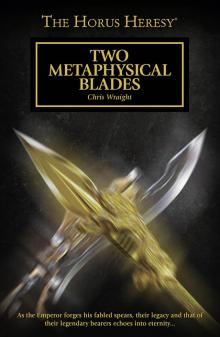 Two Metaphysical Blades
Two Metaphysical Blades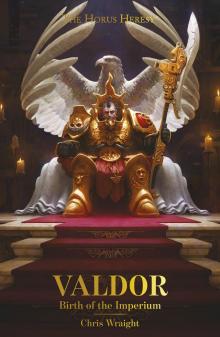 Valdor: Birth of the Imperium
Valdor: Birth of the Imperium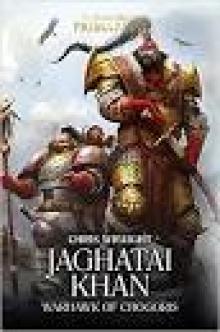 JAGHATAI KHAN WARHAWK OF CHOGORIS
JAGHATAI KHAN WARHAWK OF CHOGORIS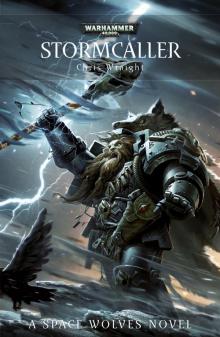 Stormcaller
Stormcaller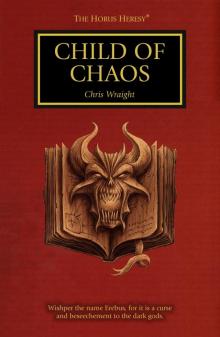 Child of Chaos
Child of Chaos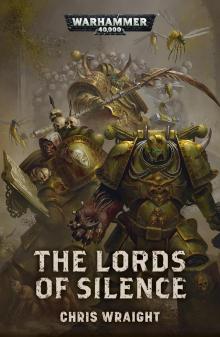 The Lords of Silence
The Lords of Silence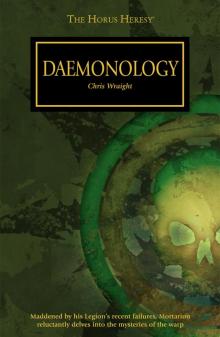 Daemonology
Daemonology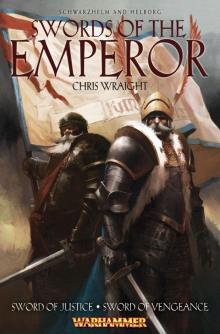 Swords of the Emperor
Swords of the Emperor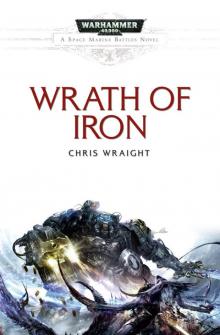 Wrath of Iron
Wrath of Iron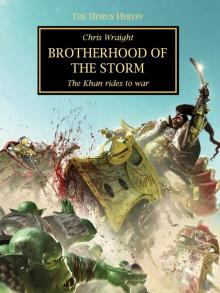 Brothers of the Storm
Brothers of the Storm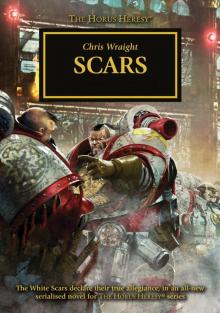 Horus Heresy: Scars
Horus Heresy: Scars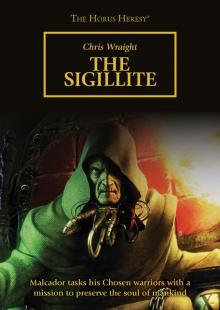 The Sigillite
The Sigillite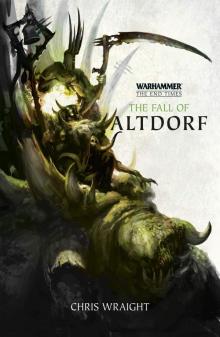 The End Times | The Fall of Altdorf
The End Times | The Fall of Altdorf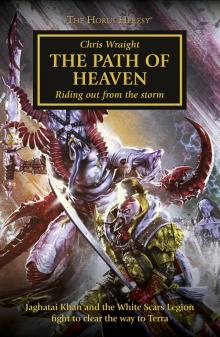 The Path of Heaven
The Path of Heaven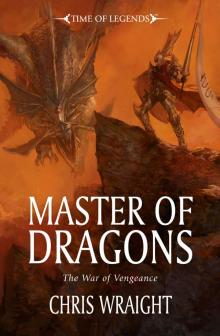 Master of Dragons
Master of Dragons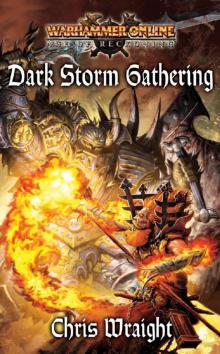 WH-Warhammer Online-Age of Reckoning 02(R)-Dark Storm Gathering
WH-Warhammer Online-Age of Reckoning 02(R)-Dark Storm Gathering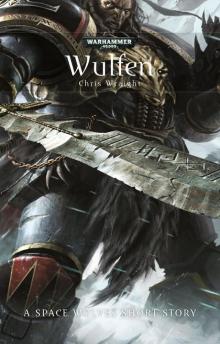 Wulfen
Wulfen Battle Of The Fang
Battle Of The Fang Onyx
Onyx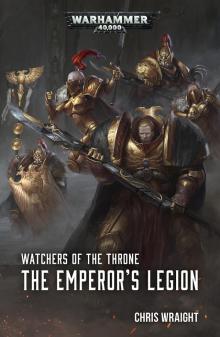 Watchers of the Throne: The Emperor’s Legion
Watchers of the Throne: The Emperor’s Legion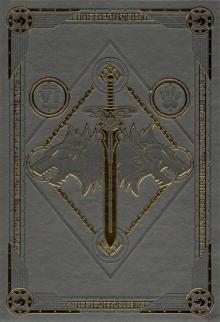 Leman Russ: The Great Wolf
Leman Russ: The Great Wolf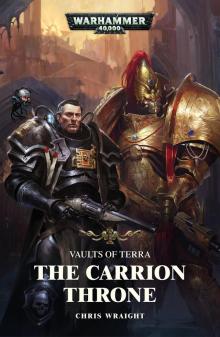 Vaults of Terra: The Carrion Throne
Vaults of Terra: The Carrion Throne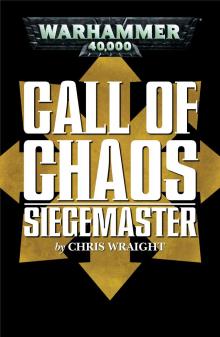 Siegemaster
Siegemaster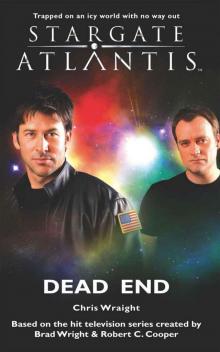 STARGATE ATLANTIS: Dead End
STARGATE ATLANTIS: Dead End Scars
Scars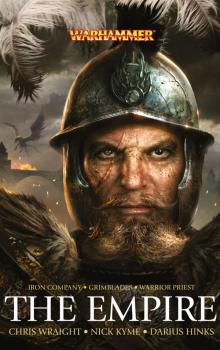 The Empire Omnibus
The Empire Omnibus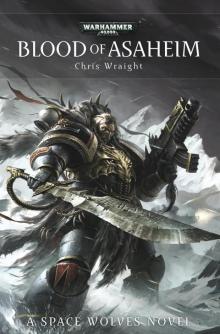 Blood of Asaheim
Blood of Asaheim